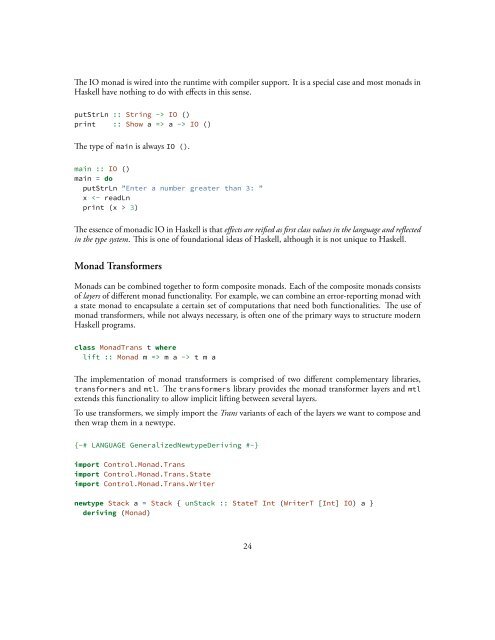Create successful ePaper yourself
Turn your PDF publications into a flip-book with our unique Google optimized e-Paper software.
e IO monad is wired into the runtime with compiler support. It is a special case and most monads in<br />
<strong>Haskell</strong> have nothing to do with effects in this sense.<br />
putStrLn :: String -> IO ()<br />
print :: Show a => a -> IO ()<br />
e type of main is always IO ().<br />
main :: IO ()<br />
main = do<br />
putStrLn ”Enter a number greater than 3: ”<br />
x 3)<br />
e essence of monadic IO in <strong>Haskell</strong> is that effects are reified as first class values in the language and reflected<br />
in the type system. is is one of foundational ideas of <strong>Haskell</strong>, although it is not unique to <strong>Haskell</strong>.<br />
Monad Transformers<br />
Monads can be combined together to form composite monads. Each of the composite monads consists<br />
of layers of different monad functionality. For example, we can combine an error-reporting monad with<br />
a state monad to encapsulate a certain set of computations that need both functionalities. e use of<br />
monad transformers, while not always necessary, is often one of the primary ways to structure modern<br />
<strong>Haskell</strong> programs.<br />
class MonadTrans t where<br />
lift :: Monad m => m a -> t m a<br />
e implementation of monad transformers is comprised of two different complementary libraries,<br />
transformers and mtl. e transformers library provides the monad transformer layers and mtl<br />
extends this functionality to allow implicit lifting between several layers.<br />
To use transformers, we simply import the Trans variants of each of the layers we want to compose and<br />
then wrap them in a newtype.<br />
{-# LANGUAGE GeneralizedNewtypeDeriving #-}<br />
import Control.Monad.Trans<br />
import Control.Monad.Trans.State<br />
import Control.Monad.Trans.<strong>Write</strong>r<br />
newtype Stack a = Stack { unStack :: StateT Int (<strong>Write</strong>rT [Int] IO) a }<br />
deriving (Monad)<br />
24


